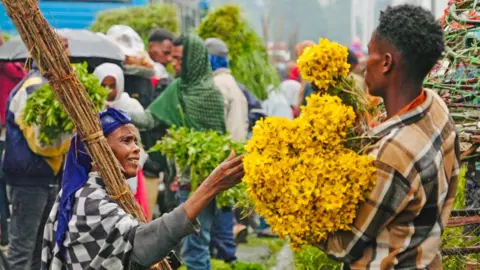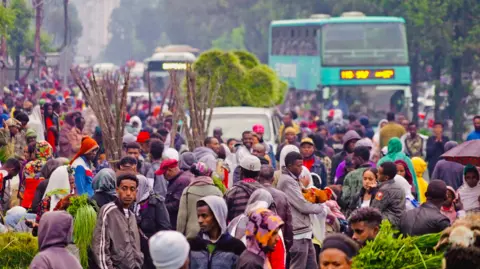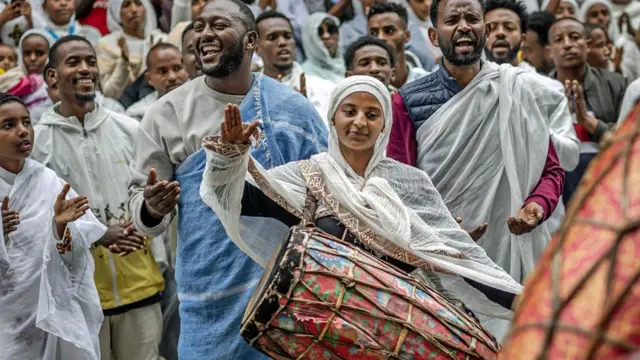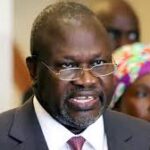Ethiopia has once again welcomed a new year in spectacular fashion, but while the rest of the world is celebrating 2025, Ethiopians are stepping into 2018. Thanks to the country’s unique calendar system, which runs seven to eight years behind the Gregorian calendar, Ethiopia has its own way of marking time and with it, its own special celebrations that bring color, culture, and unity to the nation.
The Ethiopian New Year, known as Enkutatash, is a deeply cherished holiday celebrated every September and filled with traditional songs, foods, flowers, and gatherings that reflect both the country’s cultural richness and its vibrant community spirit.

In the streets of Addis Ababa, yellow flowers called adey ababa symbolic of renewal and beauty, could be seen everywhere. At markets like Addisu Gebeya, vendors did brisk business selling bunches of flowers, freshly cut grass for coffee ceremonies, and even livestock such as chickens and sheep for the traditional New Year feast. Chickens, often used in the spicy stew doro wat, were selling for as much as 3,000 birr ($14), while sheep decorated with colorful ribbons were fetching up to 22,000 birr ($105). For wealthier families, oxen, priced at nearly 300,000 birr ($2,000) were the centerpiece of grand feasts, prepared alongside the country’s beloved injera, a fermented flatbread.
As the evening of New Year’s Eve approached, excitement spilled into the streets despite the rain. Families completed their shopping, musicians tuned up their instruments, and posters for concerts and live events lit up the city. Addis Ababa’s hotels and venues came alive at midnight, where live bands, sparklers, and the voices of crowds welcomed the arrival of 2018 with joy. For many, the highlight was the sound of Abebayehosh, a traditional New Year’s song performed by groups of young girls who went door-to-door, offering blessings of hope and happiness for the year ahead.
Churches also played a central role in the festivities. At Entoto St Raguel Church, priests and deacons in ornate robes led services filled with incense, prayer, and religious songs. Vendors lined the church grounds selling ceremonial umbrellas, shawls, and religious items, while thousands of Orthodox Christians gathered to pray for prosperity, peace, and renewal. The Ethiopian New Year is not solely a religious holiday, but for many, it is inseparable from faith and tradition.
Ethiopia’s unique calendar system is one of the most fascinating aspects of its cultural identity. The difference stems from how the Ethiopian Orthodox Church calculated the birth year of Jesus Christ differently from the Catholic Church when the latter revised its calculations in the 5th century. As a result, while much of the world marks 2025, Ethiopians celebrate 2018. The Ethiopian calendar also consists of 13 months — 12 months of 30 days each, plus a 13th month of 5 or 6 days, depending on whether it is a leap year.
This year’s New Year festivities carried an added sense of pride and optimism, coinciding with the formal launch of the Grand Ethiopian Renaissance Dam (GERD), a historic infrastructure project on a tributary of the Nile that symbolizes national unity, progress, and resilience. The timing of the dam’s launch alongside the New Year underscored Ethiopia’s commitment to renewal, growth, and a brighter future.

As the rains cleared, families gathered for meals, children sang in the streets, and the sound of drums and laughter echoed across the country. For Ethiopians, Enkutatash is more than just a holiday; it is a celebration of identity, heritage, and community. It marks the end of the rainy season, the beginning of spring, and the spirit of optimism that comes with renewal. Whether through a simple meal of doro wat or a grand feast with oxen, the Ethiopian New Year is a time for joy, reflection, and togetherness.
In Ethiopia, switching between calendars is second nature. In local languages, people proudly say it is 2018, but in English, they easily shift to calling it 2025. This seamless duality is a reminder of Ethiopia’s unique place in the world a nation proud of its traditions while engaging with the global community.
As fireworks lit up Addis Ababa and voices rang with music and prayer, Ethiopians entered 2018 with hope, gratitude, and determination. Enkutatash remains one of the most vibrant and meaningful celebrations in Africa, a symbol of resilience, unity, and the timeless rhythm of Ethiopian culture.













Leave a comment